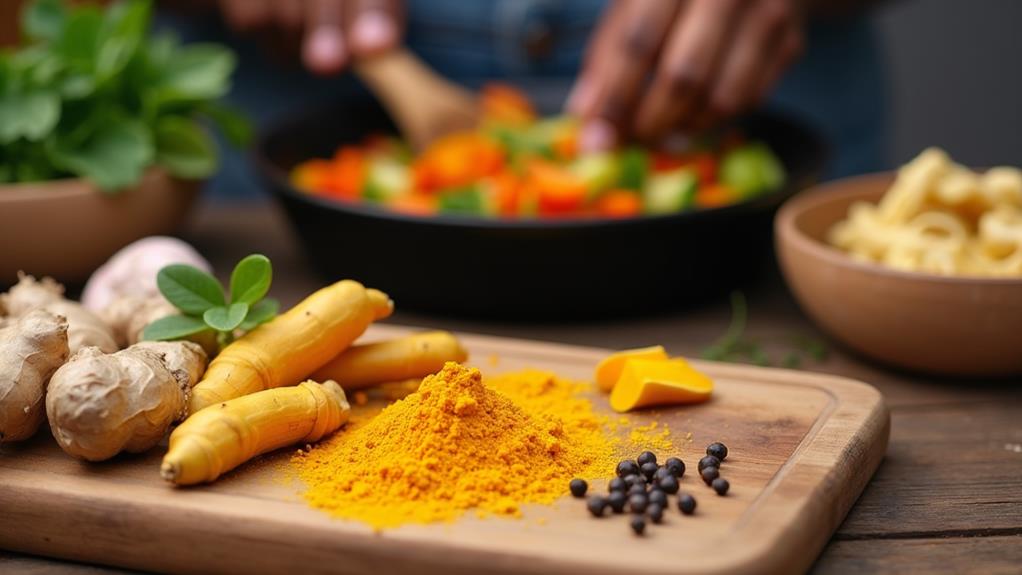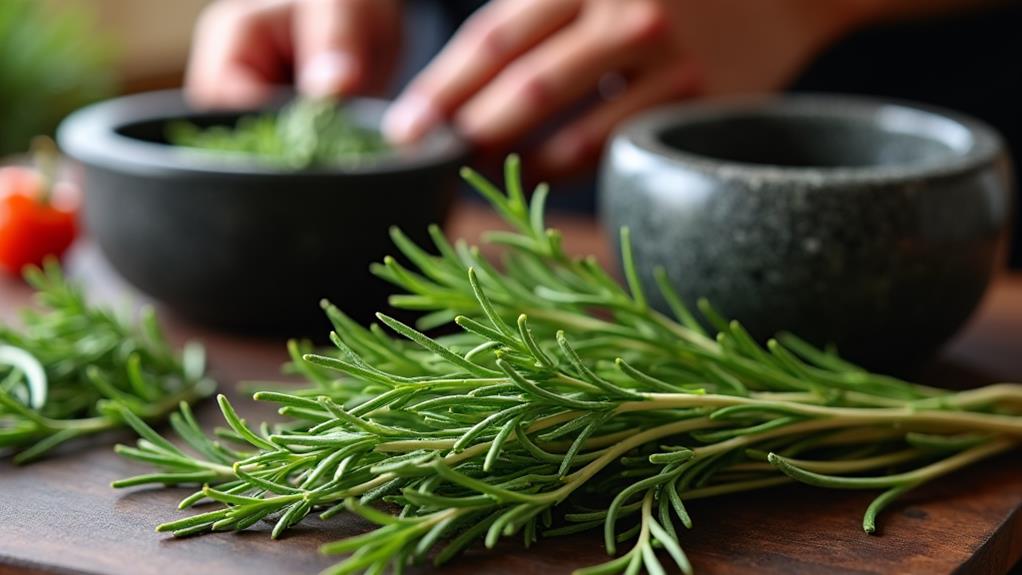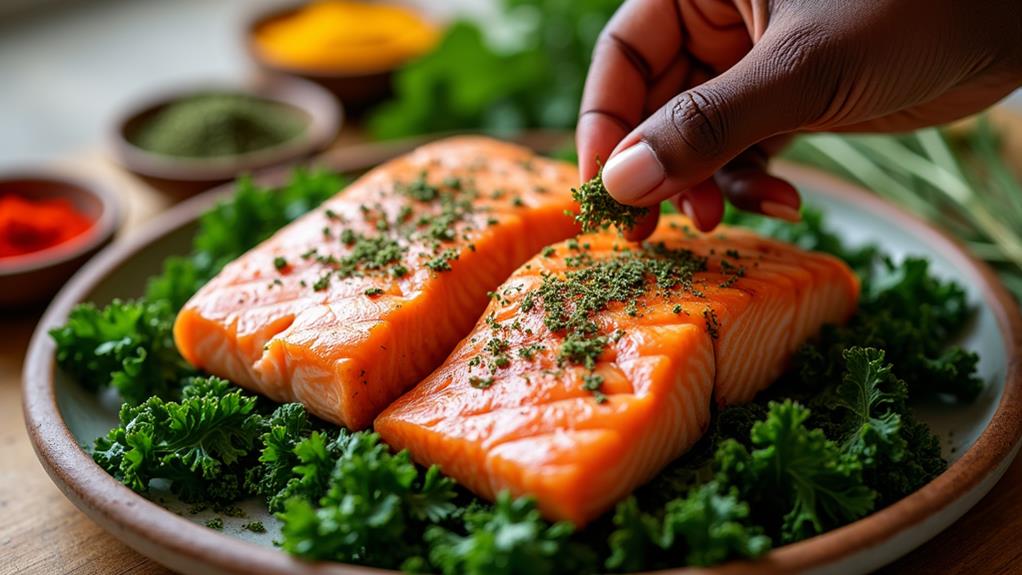You've probably heard that a healthy diet is essential for heart health, but did you know that certain herbs and spices can give your cardiovascular system an extra boost? For Black families, who often face higher risks of heart disease, incorporating these powerful ingredients into daily meals can make a significant difference. From the golden warmth of turmeric to the zesty kick of cayenne pepper, each spice brings its own unique benefits to the table. But it's not just about adding flavor—these natural remedies have been shown to lower blood pressure, reduce cholesterol, and improve circulation. So, what are these miracle spices, and how can you use them?
Key Takeaways
- Turmeric reduces inflammation, lowers heart disease risk, and improves blood vessel function, especially when paired with black pepper.
- Garlic lowers blood pressure and cholesterol, reduces clot risks, and prevents plaque buildup in blood vessels.
- Ginger boosts circulation, lowers blood pressure, reduces LDL cholesterol, and prevents blood clots.
- Cayenne pepper improves circulation, supports healthy cholesterol levels, and aids in weight management by boosting metabolism.
- Hibiscus significantly reduces blood pressure and is high in anthocyanins that relax blood vessels.
Turmeric: Golden Spice for Hearts

With its vibrant golden hue, turmeric stands out as a powerhouse spice for heart health. This ancient spice contains curcumin, a compound with potent anti-inflammatory and antioxidant properties. These qualities make turmeric particularly beneficial for your cardiovascular system.
Curcumin helps reduce inflammation in your blood vessels, which can lower your risk of heart disease. It also improves the function of your blood vessel lining, enhancing blood flow and reducing the risk of clots.
In addition, turmeric may help lower cholesterol levels and prevent the oxidation of LDL cholesterol, a key factor in the development of atherosclerosis.
You can easily incorporate turmeric into your diet. Add it to soups, stews, and rice dishes for a flavor and health boost. For maximum absorption, pair turmeric with black pepper, which contains piperine, a compound that enhances curcumin's bioavailability.
You can also try golden milk, a warming beverage made with turmeric, milk, and other spices. Remember, while turmeric is generally safe, it's always wise to consult your healthcare provider before making significant dietary changes, especially if you're on medication.
Garlic: Cardiovascular Powerhouse
Packing a powerful punch for heart health, garlic has been revered for centuries as a medicinal herb. It's not just a flavor enhancer; garlic's cardiovascular benefits are backed by science. This pungent bulb contains allicin, a compound that helps lower blood pressure and reduces cholesterol levels.
You'll be pleased to know that garlic can improve your heart health in multiple ways. It thins your blood, reducing the risk of dangerous clots. Garlic also acts as an antioxidant, protecting your blood vessels from damage caused by free radicals.
Regular consumption may even help prevent the buildup of plaque in your arteries, a key factor in heart disease.
To reap these benefits, aim to include garlic in your daily diet. Fresh is best, but don't worry if you can't stomach raw cloves. Cooked garlic still offers health perks, though cooking reduces some of its potency.
You can also consider garlic supplements, but consult your doctor first, especially if you're on blood thinners. Remember, consistency is key – make garlic a staple in your heart-healthy lifestyle for long-term benefits.
Ginger: Circulation-Boosting Root

Ginger, another powerhouse in the world of heart-healthy herbs, offers unique benefits for your cardiovascular system. This pungent root has been used for centuries in traditional medicine and culinary applications. It's packed with compounds that can improve your heart health in multiple ways.
One of ginger's primary benefits is its ability to boost circulation. It helps widen your blood vessels, allowing blood to flow more freely throughout your body. This improved circulation can lower your blood pressure and reduce the strain on your heart.
Additionally, ginger has anti-inflammatory properties that may help reduce the risk of heart disease by combating chronic inflammation in your arteries.
You'll also find that ginger can help lower cholesterol levels, particularly LDL (bad) cholesterol. It may even help prevent the formation of blood clots, which can lead to heart attacks and strokes.
To incorporate ginger into your diet, try adding fresh grated ginger to teas, smoothies, or stir-fries. You can also use powdered ginger in baking or as a seasoning for various dishes.
Cayenne Pepper: Spicy Heart Helper
Cayenne pepper, the fiery red spice, packs a powerful punch for your heart health. This vibrant seasoning contains capsaicin, a compound that's been shown to support cardiovascular function. When you add cayenne to your meals, you're not just spicing things up; you're giving your heart a boost.
Capsaicin helps improve blood circulation by promoting the expansion of blood vessels. This can lead to lower blood pressure and reduced strain on your heart. It also supports healthy cholesterol levels by increasing the breakdown of LDL (bad) cholesterol.
You'll find that cayenne pepper can help regulate blood sugar levels, which is essential for heart health, especially if you're at risk for diabetes. The spice may also aid in weight management by boosting metabolism and reducing appetite.
To incorporate cayenne into your diet, sprinkle it on eggs, add it to soups, or mix it into marinades. Start with small amounts and gradually increase as you build tolerance. Remember, a little goes a long way.
If you have a sensitive stomach or take certain medications, consult your doctor before greatly increasing your cayenne intake.
Cinnamon: Sweet Protection

Sprinkling a dash of cinnamon into your diet might be one of the sweetest ways to protect your heart. This aromatic spice has been shown to lower blood sugar levels, which is vital for heart health, especially if you're at risk for or managing diabetes.
Cinnamon can also help reduce LDL cholesterol and triglycerides, two major contributors to heart disease.
You'll find it easy to incorporate cinnamon into your daily routine. Try adding it to your morning oatmeal, blending it into smoothies, or using it to flavor your coffee.
For a heart-healthy dessert, sprinkle cinnamon on sliced apples or mix it into Greek yogurt. When shopping, opt for Ceylon cinnamon, also known as "true" cinnamon, as it's considered safer for regular consumption than the more common Cassia variety.
While cinnamon offers promising benefits, it's not a magic cure-all. Use it as part of a balanced diet rich in fruits, vegetables, and whole grains.
Hibiscus: Floral Blood Pressure Reducer
A vibrant crimson cup of hibiscus tea might be your ticket to lower blood pressure. This floral brew, popular in many African and Caribbean cultures, has been shown to considerably reduce both systolic and diastolic blood pressure. Hibiscus tea's power lies in its high concentration of anthocyanins, which are potent antioxidants that help relax blood vessels and improve circulation.
You'll find hibiscus easy to incorporate into your daily routine. Brew it hot or cold, and enjoy it throughout the day. For maximum benefits, aim for 2-3 cups daily. You can also add dried hibiscus to smoothies or use it as a natural food coloring in desserts.
While hibiscus is generally safe, it's important to consult your doctor if you're on blood pressure medication, as it may enhance the effects.
Pregnant women should avoid hibiscus due to its potential to stimulate contractions. Remember, hibiscus isn't a replacement for prescribed medications, but it can be a valuable addition to your heart-healthy lifestyle.
Rosemary: Antioxidant-Rich Herb

Rosemary, with its needle-like leaves and aromatic scent, packs a powerful punch for heart health. This herb is rich in antioxidants, particularly carnosic acid and rosmarinic acid, which help protect your heart from oxidative stress and inflammation. These compounds can reduce the risk of atherosclerosis, a condition where plaque builds up in your arteries.
You'll find that rosemary can improve your blood circulation and boost your immune system. It's also known to enhance memory and concentration, which may indirectly benefit your heart by reducing stress levels.
To incorporate rosemary into your diet, try adding it to roasted vegetables, grilled meats, or homemade bread.
Research suggests that rosemary may help lower blood sugar levels, making it particularly beneficial for those with diabetes or at risk of heart disease. It's also been shown to have potential anti-cancer properties.
When using rosemary, remember that a little goes a long way. Start with small amounts and adjust to your taste preferences. You can use fresh or dried rosemary, but fresh will provide the most potent benefits.
Thyme: Tiny Leaves, Big Benefits
Thyme, despite its diminutive leaves, often delivers outsized benefits for heart health. This aromatic herb contains compounds that can help lower blood pressure and reduce the risk of heart disease. Thyme is rich in flavonoids, particularly lutein, zeaxanthin, and naringenin, which have potent antioxidant properties.
You'll find that thyme's anti-inflammatory effects can help protect your blood vessels from damage caused by chronic inflammation. It's also a good source of vitamin C, which supports the production of collagen, an essential component of healthy arteries.
Additionally, thyme contains iron, manganese, and vitamin K, all of which contribute to overall cardiovascular health.
To incorporate thyme into your diet, try adding it to soups, stews, and roasted vegetables. You can also use it to season lean meats or sprinkle it on whole-grain bread. Fresh thyme has a more robust flavor, but dried thyme is convenient and still offers health benefits.
Incorporating Spices Into Daily Meals

Incorporating heart-healthy herbs and spices into your daily meals doesn't have to be complicated. Start by adding small amounts to dishes you already enjoy. Sprinkle cinnamon on your morning oatmeal or mix turmeric into scrambled eggs.
For lunch, toss fresh basil into your salad or add oregano to your sandwich spread. At dinner, rub garlic and rosemary onto chicken before grilling or stir cumin into your vegetable soup.
Experiment with herb and spice blends to create new flavor profiles. Try a Cajun mix with paprika, cayenne, and thyme for a spicy kick, or a Mediterranean blend with oregano, basil, and parsley for a savory touch.
Don't forget about beverages – add fresh mint to your water or steep ginger in your tea.
When cooking, add dried herbs early in the process to allow their flavors to develop, but save fresh herbs for the end to preserve their delicate taste and aroma.


